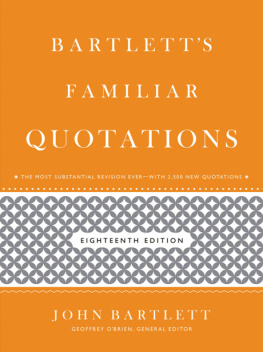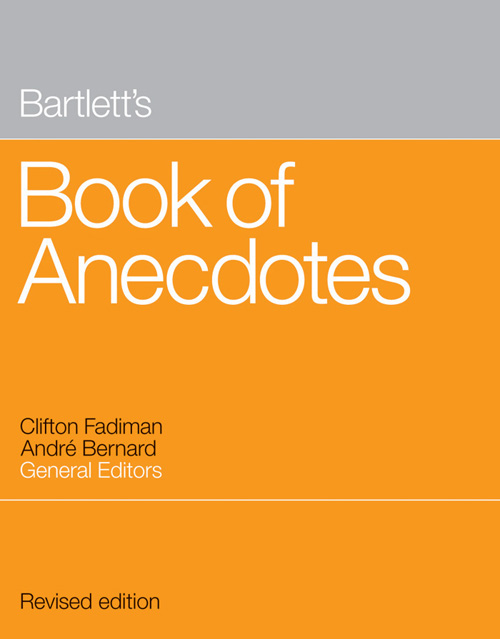Copyright 1985, 2000 by Little, Brown and Company
Introduction copyright 2000 by Clifton Fadiman and Andr Bernard
All rights reserved. No part of this book may be reproduced in any form or by any electronic or mechanical means, including information storage and retrieval systems, without permission in writing from the publisher, except by a reviewer who may quote brief passages in a review.
Little, Brown and Company.
Hachette Book Group
237 Park Avenue
New York, NY 10017
Visit our website at www.HachetteBookGroup.com.
The Warner Books name and logo are trademarks of Hachette Book Group, Inc.
FIRST REVISED EDITION
This book is an updated and revised edition of The Little, Brown Book of Anecdotes, edited by Clifton Fadiman.
First eBook Edition: September 2000
ISBN: 978-0-446-93126-7
Copyright acknowledgments may be found at the back of the book, following the indexes.
And once when saying his prayers, which he [Sydney Smith] always did out loud, he was overheard to say: Now Lord, Ill tell you an anecdote.
Patrick Mahony,
Introduction to Barbed Wit and Malicious Humor

THIS BOOK IS FOR THE MOST PART A COLLECTION OF ANECDOTES ABOUT READILY IDENTIFIABLE PEOPLE AND IS ORGANIZED ALPHABETICALLY BY PERSON. Where doubt exists as to whom an anecdote should be ascribed, we have usually chosen the more familiar name. In as many cases as possible, we have placed the anecdote with that person whose character is most revealed. Some anecdotes included here are connected with obscure or unfamiliar names or places. They were so interesting in their own right that we included them in no particular order. To distinguish them from the regular text, they are boxed.
We hope Bartletts Book of Anecdotes has value as a work of reference as well as one of entertainment. It does not, however, claim to be a work of exact scholarship, and should not be used as an infallible encyclopedia. Anecdotes are by nature often well worn; while in circulation (and after decades or even centuries) attributions can be mixed up, dates can be changed, and the very point of the stories can be lost. But we have done our best to verify the historical accuracy of those anecdotes we have included in this volume. We hope it presents a lively mix of the hoary and the fresh, to give a full tour of the world of the anecdote.
The editors are especially grateful to a few exceptionally fine collections of anecdotes that are available to the general reader and that have provided us with source material. All collections like ours are in part the product of pilferage; we have tried to stop short of pillage. Foremost among our sources are the volumes prepared by Paul F. Boller, Jr., which include Presidential Anecdotes, Presidential Wives, Hollywood Anecdotes, and Presidential Campaigns, all published by Oxford University Press. While stories about presidents, their wives, and their campaigns can be found readily, Mr. Boller has collected, selected, and written the best, and his extensive listing of sources attests to his thorough and original research. The reader is urged to turn to his books for a more complete and definitive collection on his chosen subjects. The same recommendation can be made for the great poet Donald Halls work on The Oxford Book of American Literary Anecdotes.
A complete bibliography lists all of our sources. In addition, the source for each anecdote is given, when known, in a Source List at the back of this book, preceding the bibliography. Every effort has been made to credit sources; where information is missing or incorrect (and with material as diverse as is included in this long volume, some gaps may be inevitable), the publisher regrets the omission and will print the correct information with full credit in subsequent printings.

Bartletts Book of Anecdotes is a revised, edited version of The Little, Brown Book of Anecdotes, the last edition of which was published in 1985. For that version, Clifton Fadiman, as General Editor, contributed and wrote anecdotes, made the final selection, and edited the volume. He also was responsible for the translations from French and German sources. Among the contributors were Joe Bryan III, Annalee and Kim Fadiman, Albert Friendly, Leo Counce Hopkins, George Lang, Henry D. Smith II, and Don and Siu Zimmerman; Ann Sleeper and Betsy Pitha; Colleen Mohyde, Margaret Freudenthal, and Virginia Creeden; and Susanne McNatt and Mary George. For the 2000 edition the editors are grateful to our editor at Little, Brown, Chip Rossetti, and especially to our copy-editor, Pamela Marshall, who made valuable suggestions and heroic corrections; both were patient and good-natured beyond any reasonable expectation.

ANCESTRY
HOW FAR BACK DO ANECDOTES GO?
As with so many other good things, what we now call anecdotes may have started in classical Greece. Joseph Epstein quotes the Italian scholar Arnaldo Momigliano, who, in his Development of Greek Biography, conjectures that the anecdotes founding father may have been the musical theorist Aristoxenus of Tarentum (born c. 370 BC): Perhaps [Aristoxenus] was the first to make anecdotes an essential part of biography. I suspect that we owe to Aristoxenus the notion that a good biography is full of good anecdotes.
Though we borrowed the term from the French, anecdote ultimately derives from an almost identical Greek word meaning things not given out, or, as we would say, unpublished. It is in this sense that Cicero uses it to describe some of his own manuscripts, a usage followed later by Renaissance scholars to denote manuscripts discovered in libraries and afterward published.
From the outset there seems also to have been attached to the word a connotation of secrecy or perhaps merely gossip. As a biographical device it was and remains anti-official, anti-panegyrical. It surprises the human being in question en pantoufles.
The anecdotes shady reputation probably derives from the sixth-century Byzantine historian Procopius, who called his posthumously published, scandalous account of the Emperor Justinian Anecdota or Historia Arcana (Secret History).
It is during the Renaissance, with the rise of cities, royal courts, a true leisure class, and the cult of the individual that the anecdote, a form of condensed gossip, begins clearly to show its face. It begins to shake off its association with the merely scandalous.
In his Dissertation on Anecdotes Isaac DIsraeli (17661848) tells us that the French broadened the term to make it apply to any interesting circumstance. In the eighteenth century Samuel Johnson defined it as a biographical incident; a minute passage of private life. The suggestion of amusing triviality now begins to emerge, so that two centuries later Winston Churchill could call anecdotes the gleaming toys of history. In the transactions of biographers they function as petty cash.
The eighteenth century also marked the beginning of the association of anecdotes with the wit of old men. You can trace it in the French aphorist Rivarol (17531801). The frayed pejorative pun anecdotage may have been invented by John Wilkes (17271797) or perhaps by Thomas De Quincey (17851859). It was made fashionable by Benjamin Disraeli in







